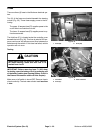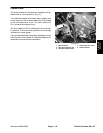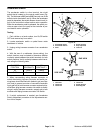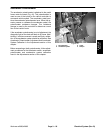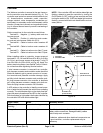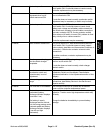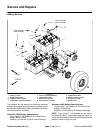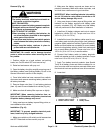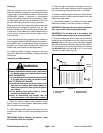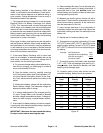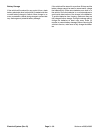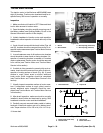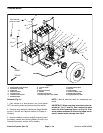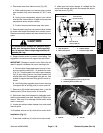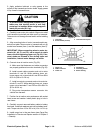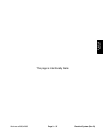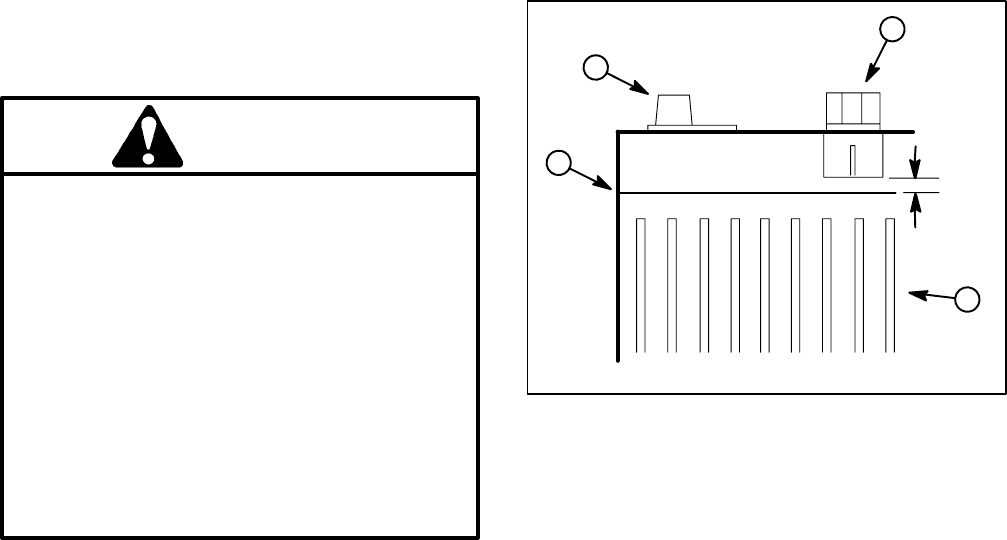
Workman e2050/e2065
Page 3 – 30
Electrical System (Rev. B)
Charging
When the vehicle is not in use, it is recommended to
keep the batteries charged by connecting the battery
charger that is included with the vehicle. The Workman
e2050/e2065 charger is designed to automatically
charge the batteries fully without overcharging. Indica-
tor lights (green and red) and an ammeter on the char-
ger give information about the charging operation.
Make sure to have the battery cell plates covered with
electrolyte before charging the batteries (Fig. 46). Peri-
odically (at least every 50 operating hours) check elec-
trolyte level in the batteries and add distilled water to
ensure proper charging and the best battery perfor-
mance and life.
Colder temperatures will increase the time needed to
fully charge the batteries. NEVER attempt to charge fro-
zen batteries. Also, if temperatures below freezing are
expected, do not add water to battery after charging as
added water could freeze and damage battery.
For additional battery charging information, see your
Operator’s Manual and the Battery Charger Operating
Instructions.
Inspection and Maintenance
WARNING
POTENTIAL HAZARD:
Battery electrolyte contains sulfuric acid which
is a deadly poison and it causes severe burns.
WHAT CAN HAPPEN:
If you carelessly drink electrolyte you could die
or if it gets onto your skin you will be burned.
HOW TO AVOID THE HAZARD:
Do not drink electrolyte and avoid contact with
skin, eyes or clothing. Wear safety glasses to
shield your eyes and rubber gloves to protect
your hands.
Fill the battery where clean water is always
available for flushing the skin.
Follow all instructions and comply with all
safety messages on the electrolyte container.
1. Check for cracks in battery case caused by overly
tight or loose hold–down retainer. Replace any battery
that is cracked and/or leaking.
2. Check battery terminal posts for corrosion. Use a ter-
minal brush to clean corrosion from the battery terminal
posts.
IMPORTANT: Before cleaning the battery, make
sure the filler caps are on tightly.
3. Check for signs of wetness or leakage on the top of
the battery which might indicate a loose or missing filler
cap, overcharging, loose terminal post or overfilling.
4. Check the battery case for dirt and oil. Clean the bat-
tery with a solution of baking soda and water, then rinse
battery with clean water.
5. Check that the battery cover seal is not broken away.
Replace the battery if the seal is broken or leaking.
IMPORTANT: Make sure the area around the battery
filler caps is clean before opening the caps.
IMPORTANT: Do not add acid to the battery. Use
only distilled water to adjust the electrolyte level.
6. Check the electrolyte level in each cell. If the level is
below the tops of the plates in any cell, add just enough
distilled water to the cell to cover the plates. Replace
filler caps and charge the battery (see Operator’s Manu-
al). After charging, check electrolyte level in all cells and
add distilled water until the level is 1/8” (3 mm) below
the bottom of the fill well (Fig. 46).
1. Battery plates
2. Filler cap
3. Electrolyte level
4. Battery terminal
Figure 46
2
1
1/8 inch
(3 mm)
3
4



